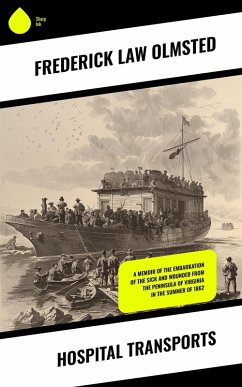In "Hospital Transports," Frederick Law Olmsted delivers a poignant examination of the logistics and infrastructure required for medical care during the Civil War. Using a blend of vivid narrative and detailed observational writing, Olmsted chronicles the transformative impact of organized hospital transport systems on the lives of countless soldiers. His prose not only captures the urgency of wartime healthcare but also reflects the broader social and political implications of such efforts, illuminating themes of compassion, sacrifice, and humanity in times of crisis. As a precursor to modern public health and transportation systems, the book occupies a significant place in both literary and medical history, showcasing Olmsted's innovative approach intertwined with a sense of moral imperative. Frederick Law Olmsted, renowned as the father of American landscape architecture, was also deeply engaged with social reform, particularly regarding issues of public health and urban planning. His experiences as a landscape architect and his observations of the Civil War propelled him to address the critical role that infrastructure plays in the healing process. This dual lens of artistry and pragmatism derives from his belief in the interconnectedness of natural and built environments, motivating him to advocate for a more humane approach to healthcare. "Hospital Transports" is an essential read for anyone interested in the evolution of healthcare practices and the significance of transportation in wartime contexts. Olmsted's insights resonate far beyond the battlefield, inviting readers to consider the system of care that supports human dignity in distress. This work is invaluable for historians, medical professionals, and anyone seeking to understand the profound interplay between environment, health, and society.
Dieser Download kann aus rechtlichen Gründen nur mit Rechnungsadresse in A, B, BG, CY, CZ, D, DK, EW, E, FIN, F, GR, HR, H, IRL, I, LT, L, LR, M, NL, PL, P, R, S, SLO, SK ausgeliefert werden.









